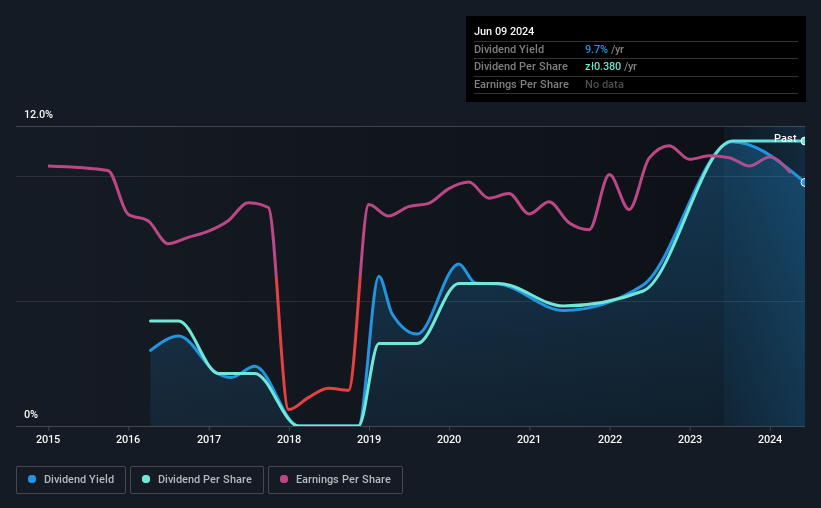
It looks like Indos SA (WSE:INS) is about to go ex-dividend in the next four days. The ex-dividend date occurs one day before the record date which is the day on which shareholders need to be on the company's books in order to receive a dividend. It is important to be aware of the ex-dividend date because any trade on the stock needs to have been settled on or before the record date. In other words, investors can purchase Indos' shares before the 14th of June in order to be eligible for the dividend, which will be paid on the 28th of June.
The company's next dividend payment will be zł0.39 per share. Last year, in total, the company distributed zł0.38 to shareholders. Calculating the last year's worth of payments shows that Indos has a trailing yield of 9.7% on the current share price of zł3.90. If you buy this business for its dividend, you should have an idea of whether Indos's dividend is reliable and sustainable. We need to see whether the dividend is covered by earnings and if it's growing.
Check out our latest analysis for Indos
Dividends are typically paid from company earnings. If a company pays more in dividends than it earned in profit, then the dividend could be unsustainable. Indos paid out more than half (52%) of its earnings last year, which is a regular payout ratio for most companies. Indos paid a dividend despite reporting negative free cash flow over the last twelve months. This may be due to heavy investment in the business, but this is still suboptimal from a dividend sustainability perspective.
Companies that pay out less in dividends than they earn in profits generally have more sustainable dividends. The lower the payout ratio, the more wiggle room the business has before it could be forced to cut the dividend.
Click here to see how much of its profit Indos paid out over the last 12 months.

Have Earnings And Dividends Been Growing?
Companies with consistently growing earnings per share generally make the best dividend stocks, as they usually find it easier to grow dividends per share. If earnings decline and the company is forced to cut its dividend, investors could watch the value of their investment go up in smoke. With that in mind, we're encouraged by the steady growth at Indos, with earnings per share up 7.8% on average over the last five years.
Many investors will assess a company's dividend performance by evaluating how much the dividend payments have changed over time. Indos has delivered an average of 13% per year annual increase in its dividend, based on the past eight years of dividend payments. It's encouraging to see the company lifting dividends while earnings are growing, suggesting at least some corporate interest in rewarding shareholders.
The Bottom Line
Is Indos worth buying for its dividend? Earnings per share have been growing at a reasonable rate, and the company is paying out a bit over half its earnings as dividends. We're unconvinced on the company's merits, and think there might be better opportunities out there.
With that being said, if dividends aren't your biggest concern with Indos, you should know about the other risks facing this business. For instance, we've identified 4 warning signs for Indos (3 make us uncomfortable) you should be aware of.
A common investing mistake is buying the first interesting stock you see. Here you can find a full list of high-yield dividend stocks.
New: AI Stock Screener & Alerts
Our new AI Stock Screener scans the market every day to uncover opportunities.
• Dividend Powerhouses (3%+ Yield)
• Undervalued Small Caps with Insider Buying
• High growth Tech and AI Companies
Or build your own from over 50 metrics.
Have feedback on this article? Concerned about the content? Get in touch with us directly. Alternatively, email editorial-team (at) simplywallst.com.
This article by Simply Wall St is general in nature. We provide commentary based on historical data and analyst forecasts only using an unbiased methodology and our articles are not intended to be financial advice. It does not constitute a recommendation to buy or sell any stock, and does not take account of your objectives, or your financial situation. We aim to bring you long-term focused analysis driven by fundamental data. Note that our analysis may not factor in the latest price-sensitive company announcements or qualitative material. Simply Wall St has no position in any stocks mentioned.
About WSE:INS
Indos
Operates as a financing and receivables management company in Poland.
Good value with adequate balance sheet.


